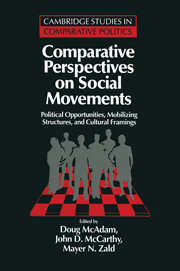 Comparative Perspectives on Social Movements
Comparative Perspectives on Social Movements Book contents
- Frontmatter
- Contents
- Biographical sketches of contributors
- Preface
- Introduction: Opportunities, mobilizing structures, and framing processes – toward a synthetic, comparative perspective on social movements
- PART I POLITICAL OPPORTUNITIES
- 1 Conceptual origins, current problems, future direction
- 2 States and opportunities: The political structuring of social movements
- 3 Social movements and the state: Thoughts on the policing of protest
- 4 Opportunities and framing in the Eastern European revolts of 1989
- 5 Opportunities and framing in the transition to democracy: The case of Russia
- PART II MOBILIZING STRUCTURES
- PART III FRAMING PROCESSES
- Notes
- References
- Index
5 - Opportunities and framing in the transition to democracy: The case of Russia
Published online by Cambridge University Press: 05 June 2012
- Frontmatter
- Contents
- Biographical sketches of contributors
- Preface
- Introduction: Opportunities, mobilizing structures, and framing processes – toward a synthetic, comparative perspective on social movements
- PART I POLITICAL OPPORTUNITIES
- 1 Conceptual origins, current problems, future direction
- 2 States and opportunities: The political structuring of social movements
- 3 Social movements and the state: Thoughts on the policing of protest
- 4 Opportunities and framing in the Eastern European revolts of 1989
- 5 Opportunities and framing in the transition to democracy: The case of Russia
- PART II MOBILIZING STRUCTURES
- PART III FRAMING PROCESSES
- Notes
- References
- Index
Summary
Until recently, Russian sociologists couldn't study social movements in their own country because there weren't any. Today, with the explosion of collective actions in the former Soviet Union, researchers are trying to develop genuine approaches to them. Cultural and political conduciveness, opportunities, and resources are very specific to the Russian transition to democracy, and this will influence proposed explanatory models. I believe the Russian case will produce its own social movement paradigms of development and research. Meanwhile, it is important to test Western research approaches on the post-Soviet case. Such a test will define the boundaries of Western models and focus the specificities of Russian social movements.
The so-called political process approach – with its emphasis on political opportunities and protest cycles and their influence on the genesis, dynamics, and success of collective actions – could be useful in understanding the social movements during the perestroika years. Yet the emergent paradigm on social construction of reality – including problems of movement ideologies, framing, meaning construction, and competition over symbolism (S. Hunt and R. Benford, 1992) – seems particularly relevant to social movements in the former USSR because of the importance of struggle over symbols during the dissolution of monopolistic Communist ideology.
I would like to use “political cycle” to denote the period of perestroika in the USSR (1985–91) that included a cycle of reforms and a cycle of protest. A protest cycle started in the political thaw provided by initial Gorbachev reforms, when opportunities for collective action appeared.
- Type
- Chapter
- Information
- Comparative Perspectives on Social MovementsPolitical Opportunities, Mobilizing Structures, and Cultural Framings, pp. 122 - 138Publisher: Cambridge University PressPrint publication year: 1996
- 14
- Cited by


